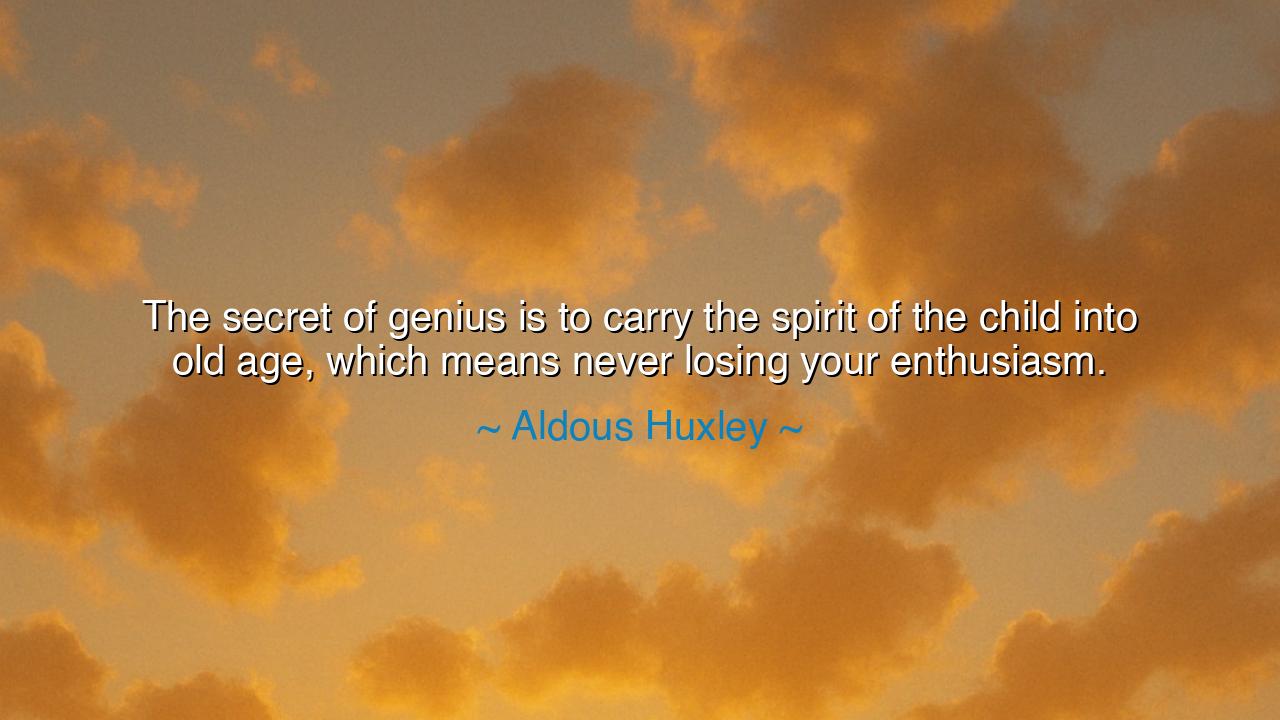
The secret of genius is to carry the spirit of the child into old
The secret of genius is to carry the spirit of the child into old age, which means never losing your enthusiasm.






Listen, O children of wisdom, for the words of Aldous Huxley carry a truth that speaks not only to the mind, but to the very spirit of life itself: “The secret of genius is to carry the spirit of the child into old age, which means never losing your enthusiasm.” These words unlock a profound understanding of what it means to live a life of creativity, vitality, and purpose. Huxley’s insight reminds us that the true genius of a person is not simply in their intellectual abilities, but in their spirit—that spark of curiosity, joy, and passion that defines a child. To preserve this childlike enthusiasm is to continue to live with a heart full of wonder, no matter how many years pass.
In the days of the ancients, the concept of enthusiasm was closely tied to the divine. The Greeks spoke of the muses, the goddesses of inspiration who filled the hearts of poets, artists, and philosophers with a fervor to create. To be enthusiastic was to be touched by the divine, to be filled with a sense of wonder and a desire to seek truth, beauty, and knowledge. Socrates, that great philosopher, exemplified this in his relentless pursuit of wisdom, never allowing the passage of time or the weight of age to dampen his curiosity. Even in his later years, Socrates retained the enthusiasm of youth, ever questioning, ever learning, ever searching for the deeper truths of the universe. He did not view old age as a time to stop asking questions or to slow the pursuit of knowledge; instead, he approached his final days with the same energy that had driven him throughout his life. In this, Socrates embodied Huxley’s notion that true genius lies in preserving the enthusiasm of youth, no matter one’s age.
The great Plato, Socrates’ student, also understood the importance of preserving enthusiasm throughout life. In his dialogues, he often referred to the philosopher-king—a ruler who, despite his wisdom and years, continued to engage with the world with childlike wonder and the desire to seek the good, the true, and the beautiful. Plato’s belief in the philosopher-king was a belief in the eternal pursuit of knowledge, one that never fades with age, but grows ever more passionate. Just as Huxley suggests, the true genius of the philosopher-king is not in his intellect alone, but in his enthusiasm for the quest, for the adventure of the mind and spirit. The enthusiasm of youth, once nurtured, becomes the driving force of a lifetime of discovery.
Consider, too, the life of Leonardo da Vinci, whose genius shone brightly throughout his long life. Despite his many achievements as an artist, scientist, and inventor, Leonardo never lost the enthusiasm that marked his youth. Even as he grew older, his curiosity only deepened, and he continued to create, to explore, and to innovate with a vitality that defied age. He remained deeply curious about the workings of the human body, the mysteries of flight, and the intricacies of nature, never allowing his body’s decline to hinder his intellectual and creative pursuits. Leonardo is a perfect example of what Huxley meant by carrying the spirit of the child into old age—he never stopped dreaming, never stopped wondering, and never stopped creating.
Huxley’s wisdom also speaks to a powerful truth about the nature of aging. In a world that often sees age as a time of decline, of slowing down, or of retreating from life’s challenges, Huxley reminds us that true vitality comes from the ability to preserve that childlike wonder that exists within all of us. The child is full of enthusiasm, quick to marvel at the simplest things, and ever ready to embrace life with energy and hope. As we age, we must guard against the temptation to give in to cynicism, complacency, or resignation. Instead, we must learn to cultivate that inner spark of the child, to live with joy and curiosity, as if life itself were still an adventure waiting to be explored. It is this enthusiasm that not only defines genius, but that defines a life well-lived, one that remains connected to the vibrancy of youth, no matter how many years have passed.
The lesson from Huxley’s words is clear: never lose your enthusiasm. As you grow older, do not let the weight of years steal the light from your eyes or the joy from your heart. Instead, nurture that childlike wonder, that curiosity, and that passion for life that carries the energy of youth into every stage of life. Whether you are 20 or 80, embrace the world with the same enthusiasm you had when you were young. Seek new knowledge, take bold steps, and never stop dreaming. The world is still full of mysteries, full of beauty, full of opportunities to create and to discover, and it is this enthusiasm that will allow you to continue to grow, to evolve, and to inspire others, no matter how many seasons you have lived through.
In your own journey, embrace the spirit of the child. Allow it to guide you through life, fueling your passions, your creativity, and your curiosity. Let the enthusiasm of youth remain as a flame within your soul, lighting your path and igniting the world around you. In doing so, you will never lose your sense of wonder, your capacity for joy, or the genius that resides in the enthusiasm of a heart that never grows tired of living fully. Let enthusiasm be the force that drives you, the force that connects you to your inner child, and the force that keeps your spirit forever young.






AAdministratorAdministrator
Welcome, honored guests. Please leave a comment, we will respond soon